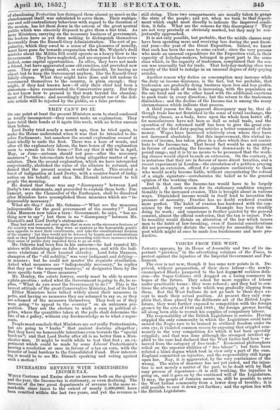INCREASING REVEN17E WITH DIMINISHING INCOME-TAX.
WHILE Customs and Excise show an increase both on the quarter and the year, the Income-tax is stationary., or even declining. The increase of the two great departments of revenue is the more re- markable since taxes to the extent of nearly 3,400,0001. have been remitted within the last two years, and yet the revenue is
still rising. These two compartments are usually taken to gauge the state of the people ; and yet, when we turn to that depart- ment which ought most directly to indicate the improved condi- tion, it fails. What are the reasons for this discrepancy ? They are not very precisely or obviously marked, but they may be con- jecturally approached. It is not only possible, but probable, that the middle classes may have been spending more and receiving less during the past finan- cial year—the year of the Great Exposition. Indeed, we know that such has been the case to some extent; since the very persons who made an unusual expenditure for the Exposition visit, in their capacity of holyday-makers, belonged in great ;part to the same class which, in the capacity of tradesmen, complained that the sea- son was unusually bad for trade. That holyday-making class was exactly of the kind to indulge in an unusual degree of duty-paying articles.
Another reason why duties on consumption may increase while the duty on income decreases, is the fact, but too probable, that tradesmen are gradually doing business upon less and less profits. The aggregate bulk of trade is increasing, with the population on the one hand and on the other hand with the additional exertions to push trade in every direction ; but the return to the tradesman diminishes ; and the decline of the Income-tax is among the many circumstances which indicate that process.
A. third reason for the apparent discrepancy may be, that al- though trade has not flourished in the sense of retail exchange, the working classes, as a body, have upon the whole been better off; for manufactures have not been so dull as retail trade, and the operation of the reformed tariff has been to give the great con- sumers of the chief duty-paying articles a better command of their money. Wages have increased relatively even where they have not increased absolutely. But this improvement, this virtual in- crease of income, has taken place in a class which does not contri- bute to the Income-tax. That broad fact would be an argument in favour of extending the Income-tax downwards to the fifty- pound range ; and it is by no means to be presumed that the work- ing classes would object to such an extension. On the contrary, it is notorious that they are in favour of more direct taxation, and a recent experiment in London—the circulation of a petition praying for such an extension, offered for signature exclusively to those who would newly become liable, without encountering the refusal of a single signature—corroborates the belief as to the general opinion of the working class. But in that case the Income-tax would have to be largely amended. A fourth reason for its stationary condition unques- tionably is the increased evasion. This is brought about in various ways. Diminished income would in itself lend to invention the pressure of necessity. Practice has no doubt rendered evasion more perfect. The habit of evasion has hardened with the con- science by the very continuance. Example has been steadily doing its 'work; and conscience is further quieted by the general consent, almost the official confession, that the tax is unjust. Pub- lic morality would dictate an alteration of the law which inures men to the habit of law-breaking, even if financial considerations did not peremptorily dictate the necessity for amending that im- post which might at once be made less burdensome and more pro- ductive.


























 Previous page
Previous page